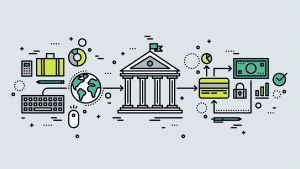 Click to learn more about author Sonal Mehta.
Click to learn more about author Sonal Mehta.
Banks are third party organizations that handle money transfer and financial transactions of their users by providing services. These services include storing money, accessing money, transferring them from one to different accounts or banks, etc. The money is stored in safe security boxes that are within a bank as a locker or safe security vault elsewhere which is under the license of the bank.
Banks store all these transactions that take place in the form a ledger, which is very much physical in nature or computerized, but still available offline rather online. Blockchain is a digital ledger platform that handle all operations similar to a bank, but without any central authority, it operates on decentralized network. Blockchain impact on banks is thus far greater in terms of giving the customer or user a maximum potential to use all services provided without any restriction or limitation.
Blockchain allows the users to store money digitally which allows them to receive and transfer funds at any given point of time, day and place. The user can access their digital cash anywhere and transfer them to the any other party at a faster rate and secured network with Blockchain. This article will help you realize the benefits of Blockchain in banking.
Two Important Attributes of Blockchain that will Shake the Banking Industry
The world of banking as we know is changing with the increased trend changes in terms of Blockchain usage. It reduces costs in many aspects and saves time and money for all users as well the service provider. The following features of Blockchain are few reasons as to how Blockchain technology in banking is a boon.
Eliminating Fraudulent Activities and Safeguarding Customer Privileges
Since Blockchain operates on a decentralized network, no changes can be made once the system is set with the initial standards. In order to make changes, the whole system of network has to be shut down and changed, which is not possible. No central authority monitors all data and thus there is a very low chance for any individual or a group to breach the network and misuse any customer information.
Banks are centralized and operate on a central network and if it is breached all stored information, data and cash becomes vulnerable to digital crime. Blockchain stores all information in the form of a digital ledger where all information is equally distributed between different blocks around the network. These blocks are time stamped and linked together with all past and current transaction, thus if there is any breach, the whole network system can be shut down. This stops potential and vulnerable digital banking crimes even before it could start.
Know Your Customer (KYC) Helps to Reduce Identity Threats
Blockchain offers transparency between the users and parties involved. Thus, it allows more operative feasibility to verify any transaction that has been made in the past or verify details of a user to make future transactions. It has become much easier to handle financial transactions as the digital cash can be accessed anywhere anytime.
All transactions made are stored and accessible to all parties involved. Anybody involved in the transaction can scrutinize the available information or data and check its viability and credibility. This add value to the transaction and plus provides a sense of secured network. Through Blockchain any business entity or institution can know their customers better and check their credibility too. This reduces the risk of any security threat or cybercrime.
Banks that Use Blockchain
Some of the banks are JPMorgan Chase, Goldman Sachs, Bank of Montreal, etc. Following are ways how they use Blockchain.
With the help of Blockchain center of excellence, JPMorgan uses the digital ledger platform Blockchain to its full potential achieving effective and efficient results.
They use Blockchain to share information and data between users and developers, thus achieving a disrupted communication between all parties. They use this feature extensively in payments and messaging so that all notifications reach their customers at the right time.
Blockchain helps these bank sectors in data mining. They arrive at solutions that support operations to be efficient by having a smooth workflow and increasing the volume size of transactions. This helps all banks institutions to management transactions efficiently by have standardized regulations and reporting.
Most important attribute of Blockchain that helps banks sectors is the ability to manage data. Managing data helps banks or any financial institution to handle all assets for better liquidation or give a competing service.
Future of Banking Industry with Blockchain
With Blockchain the opportunities that are available are huge in number, which makes a friendlier and feasible connected relationship between the banks and the customers. There will be much more changes coming in the future as Blockchain technology is still evolving. Though this technology has a lot of boons, at present it is forced to follow the current privacy laws and regulation. This is because the exploration of this technology and its consequences or effects on different industry sectors is still yet to reach the shore of what we know.
Image Credits: Solulab

